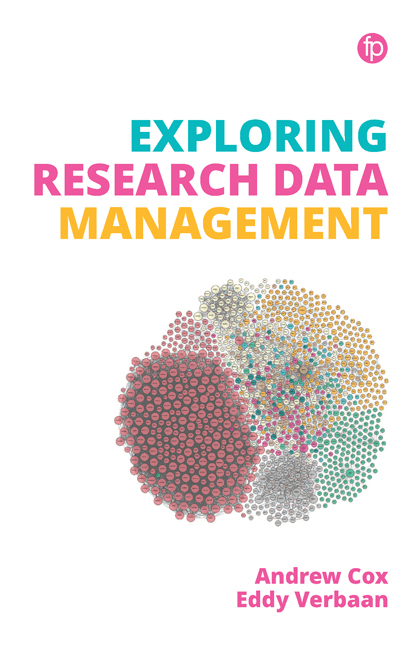Book contents
- Frontmatter
- Contents
- List of tables and figures
- 1 Introducing Research Data Management
- 2 The Social Worlds of Research
- 3 What Are Research Data?
- 4 Case Study of RDM in an Environmental Engineering Science Project
- 5 RDM: Drivers and Barriers
- 6 RDM as a Wicked Challenge
- 7 Research Data Services
- 8 Staffing a Research Data Service
- 9 Requirements Gathering for a Research Data Service
- 10 Institutional Policy and the Business Case for Research Data Services
- 11 Support and Advice for RDM
- 12 Practical Data Management
- 13 Data Management Planning
- 14 Advocacy for Data Management and Sharing
- 15 Training Researchers and Data Literacy
- 16 Infrastructure for Research Data Storage and Preservation
- 17 Evaluation of RDS
- 18 Ethics and Research Data Services
- 19 A Day in the Life Working in an RDS
- 20 Conclusion: the Skills and Mindset to Succeed in RDM
- Index
3 - What Are Research Data?
Published online by Cambridge University Press: 21 September 2019
- Frontmatter
- Contents
- List of tables and figures
- 1 Introducing Research Data Management
- 2 The Social Worlds of Research
- 3 What Are Research Data?
- 4 Case Study of RDM in an Environmental Engineering Science Project
- 5 RDM: Drivers and Barriers
- 6 RDM as a Wicked Challenge
- 7 Research Data Services
- 8 Staffing a Research Data Service
- 9 Requirements Gathering for a Research Data Service
- 10 Institutional Policy and the Business Case for Research Data Services
- 11 Support and Advice for RDM
- 12 Practical Data Management
- 13 Data Management Planning
- 14 Advocacy for Data Management and Sharing
- 15 Training Researchers and Data Literacy
- 16 Infrastructure for Research Data Storage and Preservation
- 17 Evaluation of RDS
- 18 Ethics and Research Data Services
- 19 A Day in the Life Working in an RDS
- 20 Conclusion: the Skills and Mindset to Succeed in RDM
- Index
Summary
Aims
The aim of this chapter is to explore what research data are. It will help you start to have productive conversations with researchers about their data.
Research data are important to (some) researchers
For many researchers in the sciences and social sciences research data are of central importance to their work. Planning the collection of appropriate data is a key part of research design. The term ‘data creation’ may often be a more accurate term than ‘data collection’ or ‘data capture’, which imply that data are something existing before the researcher intervenes to actively construct them. But the language in use varies between fields of study and not all research projects actively create data. Creating data may take up many hours of work, and can be one of the most exciting parts of the research process, where the researcher gets into the laboratory or out into the field in the hope of finding something new. Then, processing the data and analysing them are central to creating new knowledge.
Skill and innovation in eliciting and then analysing data is central to one's success as a researcher. The researcher's deep relationship to data is strongly linked to their methodological commitments about how they believe science builds knowledge. A common understanding of methods is a central aspect of their subject discipline. Thus they have a strong investment in research data and a concern with their quality.
Actually, in many fields there is a kudos attached to collecting data oneself. It could be seen as a rite of passage for the novice researcher in some subjects. When talking about their work researchers often talk about ‘my data … my stuff ’. This points to the strong relationship between research, research data and identity. The conversation about research data is a deep one. We have even heard researchers talk about their data as their ‘life's work’. Material they are gathering is part of building a legacy. Imagine the researcher who has pursued their interests over multiple projects throughout a long research career. To them they have an intimate connection to the various datasets that they have accumulated and pored over for many hours. Often it can be this, as much as pragmatic concerns such as fear of being beaten to publication, that inhibits research data sharing.
Information
- Type
- Chapter
- Information
- Exploring Research Data Management , pp. 19 - 32Publisher: FacetPrint publication year: 2018
